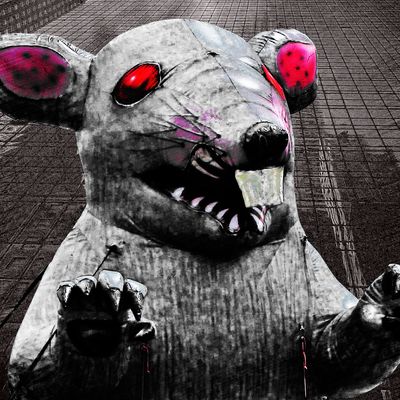
Will the Trump administration ever leave Scabby the Rat alone? Unlikely, Gothamist reported on Monday. The aggressive-looking rat inflatable is beloved by unions, who display it and other inflatable animals to protest bad management practices or to indicate a picket line. Others, though, aren’t quite so fond of Scabby and his comrades. Peter Robb, who is the National Labor Relations Board’s conservative general counsel, despises the rat, and has waged a committed battle against its display since his confirmation in 2017. Robb, as Gothamist reports, believes the rat and his helium comrades constitute unlawful and coercive speech, and is determined to ban or at least severely restrict their use.
Scabby’s vicious features are a familiar sight to many, as I reported previously for Intelligencer. He probably appeared first in 1989, and then again in 1990, when members of two Illinois unions — the International Union of Bricklayers and Allied Craftworkers and the International Union of Operating Engineers — began displaying him as a form of protest. (IUOE Local 150 says it created and named the rat.) Though it isn’t clear exactly when Scabby’s popularity escaped state borders, we do know that he quickly became a fixture at labor protests around the world. He is purposefully gross to behold. Filthy, diseased, and despised, the rat not only symbolizes bad management; he also represents secondary workers or scabs, who betray their comrades by crossing a picket line. Sometimes he stands alone. On other occasions he is accompanied by a wicked-looking cat or pig, other symbols for greedy bosses. Locals often own a Scabby or two (or six or eight, as one New York City union told Gothamist), but the rats are also shared among labor organizers as needed.
The owner of a Staten Island ShopRite may soon give the general counsel the opportunity he seeks, Gothamist noted. In June, attorneys for Mannix Family Market filed a complaint with the NLRB over the use of rat and cockroach balloons by the Construction & General Building Laborers Local 79. “If the case is not settled,” Gothamist continues, “it will go before an administrative judge at the NLRB who’s been advised by the general counsel’s memo that Scabby is impermissible.” The NLRB may side with management, again.
Robb’s argument might not survive a legal challenge. Precedent solidly favors Scabby’s status as an exemplar of free speech. Even so, it’s worth grasping the full implications of the NLRB’s efforts at rodent extermination. With Eugene Scalia poised to replace Alex Acosta as Secretary of Labor, the scale of the Trump administration’s hostility to workers is as apparent as ever. Scalia, a consistent proponent of deregulation, could roll back the same workplace protections that unions struggled mightily to create. At the NLRB, meanwhile, Robb’s dislike for Scabby is in character with his trajectory as general counsel. In all things, the Trump administration is committed to policies that empower management at the expense of workers.
Consider Robb’s record again: Before he was general counsel, Robb once worked as a special labor counsel for Proskauer Rose, a notoriously anti-union law firm. Proskauer Rose attorneys have, at different points in the firm’s bleak history, represented Volkswagen, Columbia University, the NFL, and the NBA in battles with existing unions or organizing drives. As general counsel for the NLRB, Robb’s decisions have predictably favored management. In May, for example, he concurred with Uber that the company’s drivers aren’t workers, but contractors — a meaningful distinction. As the New York Times explained at the time, federal labor law deprives contractors of certain organizing protections; Robb’s ruling will make it difficult, if not technically impossible, for Uber drivers to form a union.
Robb’s war on Scabby defies legal precedent, but it possesses a coherent internal logic. Robb understands Scabby’s precise value to labor; he knows why a snarl usually bares the rat’s teeth. Scabby serves two functions. He tells the truth about the boss, and he asks for solidarity. Respect the picket line, join the protest, or at least take the handbills on offer; Scabby is as much a call to action as he is a union’s proof of life. His existence undermines a central doctrine of the Trump administration, which mingles a professed commitment to the betterment of the American worker with a steadfast drive to enrich the wealthy and deregulate industry. The NLRB might work for management these days, but as long as Scabby persists, labor can at least attach social consequences to exploitation. The rat doesn’t just make injustice visible. He shames it, and makes it impossible to ignore. Robb — like Trump, and Scalia — wants to silence labor’s snarl, and that’s why he’s got Scabby in his sights.






























